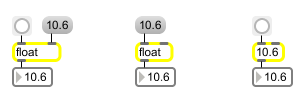| bang |
|
In left inlet: Sends the stored value out the outlet. |
| int |
input [int]
|
Converted to float. |
| (inlet1) |
set-input [float]
|
In right inlet: The number replaces the stored value without triggering output. |
| float |
input [float]
|
In left inlet: The number replaces the currently stored value and is sent out the outlet. |
| send |
receive-object-name [list]
|
In left inlet: The word send, followed by a name of a receive object, sends the number stored in the float object to all receive objects with that name, without sending it out the float object's outlet. |
| set |
set-input [float]
|
In left inlet: The word set, followed by a number, replaces the stored value without triggering output. |

